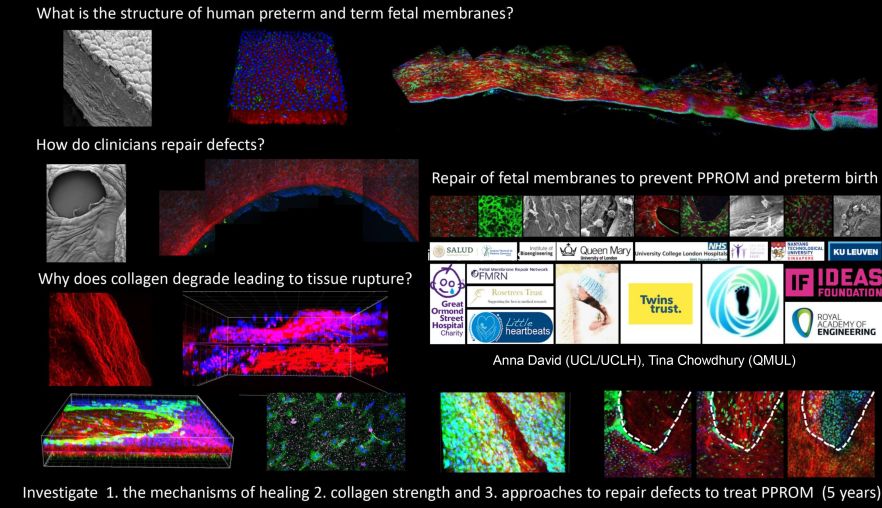Research
Tommy’s National Preterm Birth Centre
| Principal investigator: | Tina CHOWDHURY |
| Co-investigator(s): | Stefaan VERBRUGGEN, Julien GAUTROT and Anna David |
| Funding source(s): | Tommy's baby charity |
| Start: 01-04-2023 / End: 31-03-2028 |

The integrity of the fetal membranes that surrounds the baby in the womb during pregnancy are vital for normal development. Once the membranes have ruptured or are damaged, they fail to heal leaving a defect until the end of pregnancy. Bacteria may move from the vagina into the womb, causing infection both to the fetus and mother. This condition is called pre-term premature rupture of the fetal membranes (PPROM) and is a common cause of preterm birth. PPROM also complicates 30% of fetal surgeries that are used to treat abnormalities in the unborn baby. There are currently no clinical solutions to improve healing of the fetal membranes and repair the tissue after fetal surgery or after the membranes rupture spontaneously.
- Our research has found a reason for this poor healing response. We found high levels of a protein called connexin 43 (Cx43) in the amniotic membrane around the defect site after fetal surgery. To encourage repair, we developed a bioadhesive technology that provides structural support with good elasticity and strength and has the potential to seal the defect site after implantation. This research has been funded by Great Ormond Street Hospital Children's charity (17QMU01) and Rosetrees Trust (M808) for three years. We now plan to integrate the bioadhesive technology with a clinically approved therapeutic agent that will reduce Cx43 and stimulate repair of the defect.
- To save animal costs, we will test the mechanical response of the bioadhesives with organ on a chip devices and improve the stretchability and structural properties of the material components by using novel silicone chemistry. This will allow us to repair defects in the membranes after surgery and design best properties for mechanical strength without the need to conduct expensive experiments in animals.
- We will facilitate delivery of the implantable technology by designing a miniature robotic system that is minimally invasive and will enable exact delivery of the bioadhesives to seal and fix the defect site leading to closure and repair of the wound.

Further details about the Tommy's National Preterm Birth Centre

